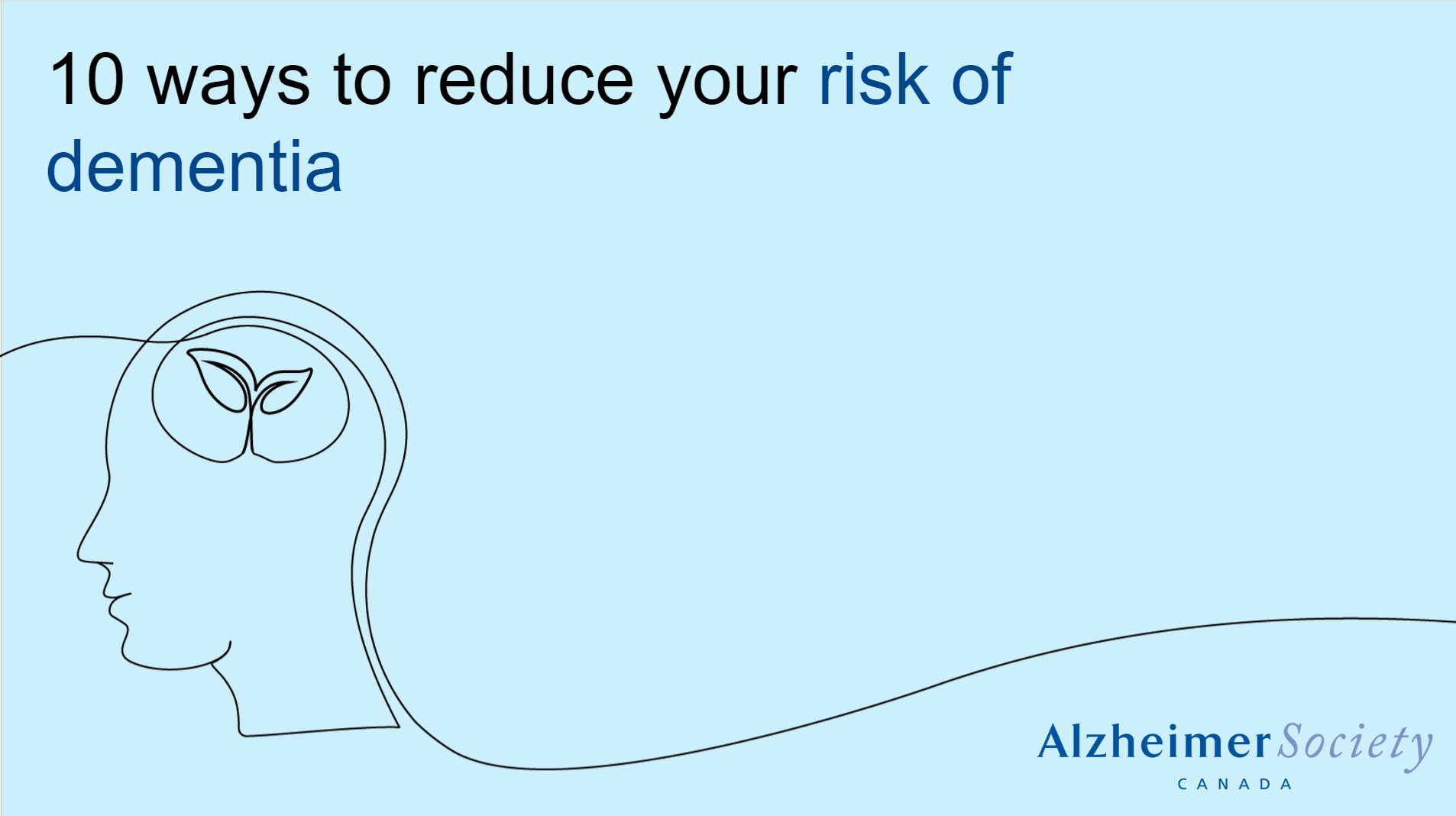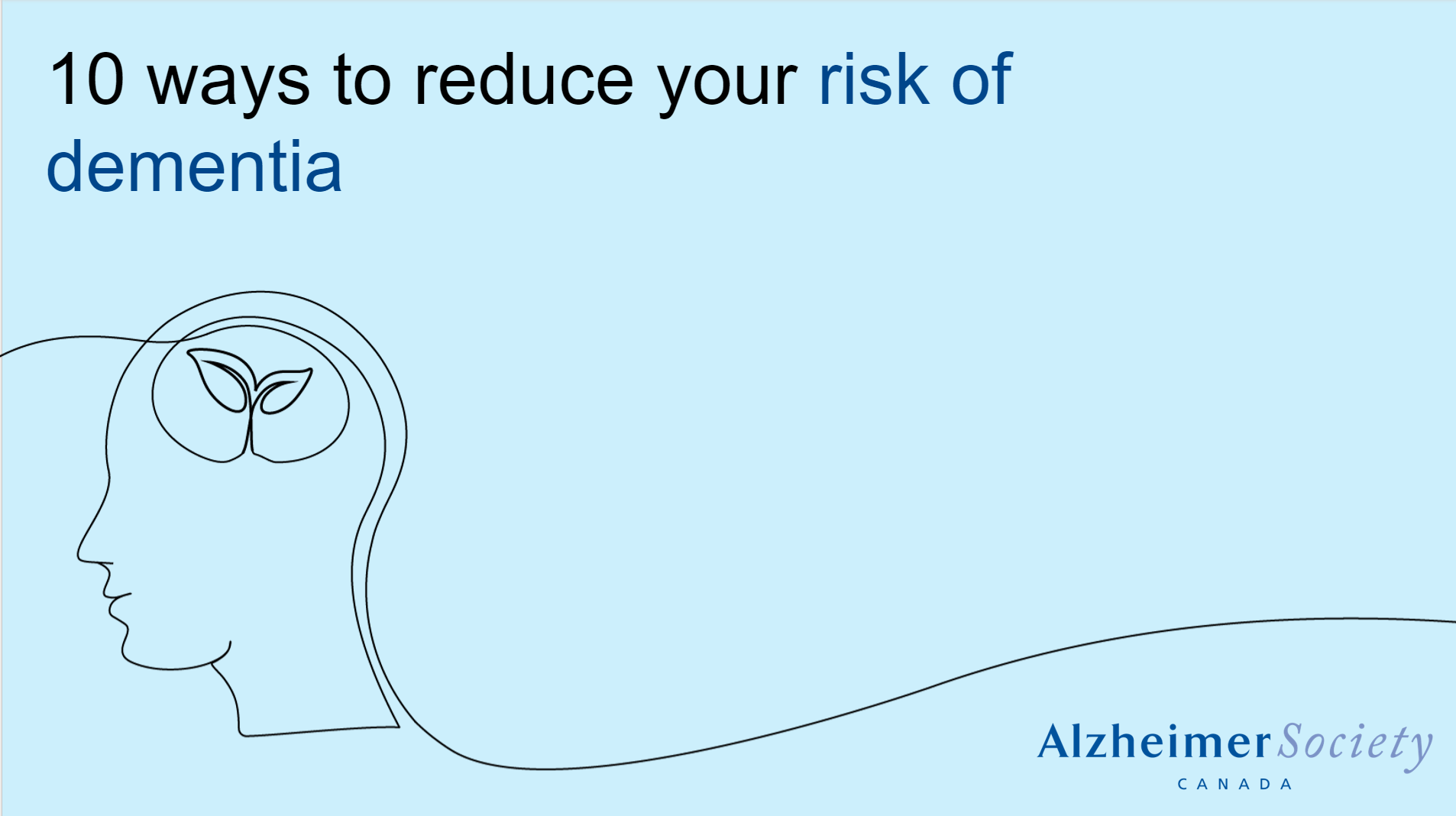Video: How to lower your dementia risk: Top 10 tips, plus emerging research
September is World Alzheimer’s Month. And in this month’s edition of Dementia Talks! Canada, experts discussed some of the top 10 ways to reduce your dementia risk.
September is World Alzheimer’s Month. And the theme of World Alzheimer’s Month 2023 is dementia risk reduction.
As Alzheimer Disease International’s motto for this month, “Never too early, never too late,” indicates, it’s always a good time to take steps to reduce your dementia risk.
In this edition of Dementia Talks! Canada, recorded on September 20, 2023, experts discussed some of the top 10 ways to reduce your dementia risk. And if you are already living with dementia, these 10 actions can also help support your overall brain health.
During this talk, we also heard from some exciting young researchers in Canada about what they are looking at next in the dementia risk field.
Speakers included:
- Dylan Guan, a PhD student at the University of Calgary who is researching how to better detect and address early dementia risk
- Rebeca Hernández Gamboa, a PhD student at the University of British Columbia who is researching how different kinds of exercise affect cognitive function
- Annalise LaPlume, a postdoctoral researcher at Toronto Metropolitan University and McGill University's Douglas Research Centre who is studying how lifestyle changes can impact dementia risk differently for women
- Myuri Ruthirakuhan, a postdoctoral researcher at Sunnybrook Research Institute who is studying how groups of cardiovascular risk factors can impact risk of dementia
All of these speakers are recent recipients of awards from the Alzheimer Society Research Program. This year, the program distributed nearly $6 million in funding to 44 researchers across Canada to change the future of dementia.
This talk is part of the monthly Dementia Talks! Canada series. Dementia Talks! Canada is produced in partnership by Alzheimer Society of Canada and Brain Canada.
If you have any questions, comments or concerns about this talk, please contact publications@alzheimer.ca anytime.
Links shared in the talk chat
- Learn about Alzheimer Disease International’s #nevertooearly #nevertoolate campaign around reducing risk the World Alzheimer’s Month: alzint.org/get-involved/world-alzheimers-month/never-too-early-never-too-late
- Native Women’s Association of Canada webpage on Aging and Dementia: nwac.ca/policy/aging-and-dementia
- Anishinaabek Dementia Care’s website: anishinaabekdementiacare.ca
- Indigenous Cognition and Aging Awareness Research Exchange website: i-caare.ca
- National Collaborating Centre for Indigenous Health website: nccih.ca
- Find our Top 10 risk reduction tips for dementia 24/7 at alzheimer.ca/reduceyourrisk
- Canadian Hard of Hearing Association resources and e-store: chha.ca
- Free 24/7 support for mental health is available at wellnesstogether.ca, 1-866-585-0445 or text WELLNESS to 741741
- Brain Injury Canada’s website: braininjurycanada.ca
- Tips for injury prevention from p=Parachute: parachute.ca/concussion
- Tips for staying active as you age: nia.nih.gov/health/participating-activities-you-enjoy-you-age
- Visit heartandstroke.ca for tips on protecting your heart health
- Find free support for quitting smoking at canada.ca/quitsmoking or smokershelpline.ca
- For support on managing the chronic disease of diabetes, visit diabetes.ca
- For resources and advocacy on understanding and managing the chronic disease of obesity, visit obesitycanada.ca
- Free exercise tips and videos for all ages are available at participaction.ca
- A free movement program for seniors from McGill University is available at safe-seniors.ca
- Exercise tips for folks living with dementia are available at dementiaexercise.com and dementiawellnesscanada.com
- Sharing Dance Older Adults from National Ballet School and Baycrest is another free online program some folks use to stay active: oa.sharingdance.ca
- Tips on drinking less alcohol from the Canadian Cancer Society: cancer.ca/en/cancer-information/reduce-your-risk/limit-alcohol/10-smart-ways-to-limit-alcohol
- Evidence-based tips on drinking less alcohol from the University of Calgary: ucalgary.ca/news/getting-out-under-influence-5-tips-and-tricks-drinking-less-alcohol
- Dry February’s website: dryfeb.ca
- The Government of Canada has some helpful tips on improving sleep at canada.ca/en/public-health/services/publications/healthy-living/canadian-adults-getting-enough-sleep-infographic.html
- Another helpful website for sleep tips is sleeponitcanada.ca
- More of the data behind our tips is available via the Lancet: thelancet.com/article/S0140-6736(20)30367-6/fulltext
- This app is also a good evidence-based tool for reducing dementia risk: luciapp.ca
- Want to participate in a fully online Canadian study on what can help protect against brain aging and dementia? Visit can-protect.ca
- Are you between 65 and 85 and want to participate in a Vancouver-based study on exercise and brain health? Contact researchers from UBC via Sarah Heath 604-875-4111 ext. 69313 or cogmob.research@hiphealth.ca.
Slide deck used in this presentation
This slide deck — available in PDF and PPT formats — was prepared by the Alzheimer Society of Canada using maily statistics from the Lancet Commission's 2020 Report on Dementia Prevention, Intervention and Care.
If re-using this slide deck for educational or non-profit purposes, please credit Alzheimer Society of Canada and that Lancet Commission report.
If adapting or changing this deck, or using for for-profit purposes, please email publications@alzheimer.ca for permissions.
This PDF slide deck was developed in September 2023 to help increase awareness of these risk factors and actions people can take to reduce risk of dementia. Data and stats come from the Lancet Commission 2020 Report on Dementia Prevention, Intervention and Care.

This is PowerPoint (PPT) slide deck featuring both slides and presentation notes used at the beginning of Dementia Talks! Canada on September 20, 2023. This deck was prepared by the Alzheimer Society of Canada. Data and stats come from the Lancet Commission 2020 Report on Dementia Prevention, Intervention and Care.

More details about the speakers
Dylan Guan

Dylan Guan is a PhD student working with Dr. Zahinoor Ismail at the University of Calgary. He received his Honours Bachelor of Science with a Neuroscience Major, Psychology Minor, and Physiology Minor from the University of Toronto. He is the Member-in-Training representative for the Alzheimer Association International Society to Advance Alzheimer Research and Treatment (ISTAART) Neuropsychiatric Syndromes Professional Interest Area, a Killam Laureate, and Alzheimer Society Research Program Doctoral Award recipient. Dylan’s research focuses on how changes in how we think, act, see, and move as we grow older can be red flags for dementia. By better understanding these red flags, Dylan hopes to improve the way we detect and address early dementia risk.
Rebeca Hernández Gamboa

Rebeca Hernández Gamboa is a psychologist and exercise scientist with clinical and academic experience. Her research focuses on the relationship between exercise and cognition. She is currently pursuing a PhD at the University of British Columbia under the guidance of Dr. Teresa Liu-Ambrose, and her research studies how various forms of physical exercise impact the cognitive abilities of older adults living with mild cognitive impairment. Her community involvement has reinforced her commitment to conduct research that directly addresses the needs of older adults living with cognitive impairment and dementia. Rebeca's goal is to become an independent investigator conducting research that promotes older adults’ neurocognitive health and functional independence. She recently received a doctoral award from the Alzheimer Society Research Program.
Dr. Annalise LaPlume

Dr. Annalise LaPlume is a postdoctoral researcher at Toronto Metropolitan University and at the Douglas Research Centre of McGill University. She studies Alzheimer's disease risk reduction and prevention. She investigates why women are at higher risk of developing Alzheimer's disease than men, and how we can help prevent dementia in men and women. Her research has been published in prestigious dementia journals, and it has also been awarded several competitive fellowships, including from the Alzheimer Society Research Program and the Quebec Consortium for Early Identification of Alzheimer's Disease.
Dr. Myuri Ruthirakuhan

Dr. Myuri Ruthirakuhan is a postdoctoral fellow at the Sunnybrook Research Institute in Toronto. Dr. Ruthirakuhan earned her PhD at the University of Toronto in the Department of Pharmacology and Toxicology. Some of her work has dealt with topics surrounding biomarkers of Alzheimer’s disease. Recently, she received an award from the Alzheimer Society Research Program to study how cardiovascular risk factors like high blood pressure, high cholesterol and diabetes can raise dementia risk when they overlap. In addition, she has received a Canadian Institutes of Health Research fellowship to study apathy and tau levels in people living with mild cognitive impairment and Alzheimer's disease.
Moderator: Leah Sandals

Leah is Senior Editor, Knowledge Translation and Exchange at the Alzheimer Society of Canada. Leah’s mother developed frontotemporal dementia (FTD) in her late 40s, and her aunts developed it in their 50s and 60s. Leah has participated in some international FTD research studies since then and also helped build out Alzheimer Society of Canada's young onset dementia hub at alzheimer.ca/youngonset.
Prior to joining the Alzheimer Society of Canada in 2021, Leah worked for 20 years in journalism and non-profit publishing.
